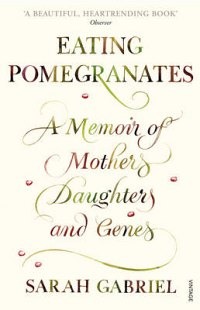by Sarah Gabriel
Flash forward most of a generation and Sarah is now herself a mother to two girls. She knows, because of her mother’s death, that she carries the M18T, a mutation on the BRCA1 gene, which is suspected of putting her at high risk of developing breast or ovarian cancer at a young age. The worst happens when she is 44. She is diagnosed with breast cancer, and has to walk her adolescent journey of angst again, this time from both sides - from the perspectives of her angry confused little girls, and of her angry, confused, possibly dying self.
When writers face down death, they write about it. There are many books from and about men and women and children who've walked the cancer road, or the road of loss to other diseases and syndromes. Many of them have merit: Ruth Picardie’s beautiful memoir Before I Say Goodbye is one of the best explorations of what it feels like to have life stolen from you too young; Michael Gearin-Tosh’s Living Proof: A Medical Mutiny is a great look at the inner war waged by cancer patients between science and soul. But I have never come across anything quite as beautifully written as Eating Pomegranates. It is real, and pragmatic, but powerfully poetic.
Here’s an extract describing the landscape of creaking old London hospitals that Sarah entered during her treatment, a landscape that is depressingly familiar to anyone who has spent time in state medical facilities in any country:
“Cancer for me takes place in nineteenth-century buildings: in old stacks of brick, seamed with soot from an era of railway and coal, buildings that have borne their load, done their bit, been rattled by trains and bombs and trucks. Buildings that have stood firm beneath the passage of feet, and made their accommodation over the course of the twentieth century to the demands of modern medicine. It takes place in errant back passages, gloomy stairwells, in lifts that rattle up two floors and give out, to be exchanged for flights of concrete steps found at the opposite end of the building. Along rumbling plywood rampways, tacked down to level out differences of height for wheelchairs and trolleys. In makeshift prefab units, dropped into gloomy courtyards to house a new administrative operation, or an outsize piece of scanning equipment.
Particularly, it takes place in miles and miles of corridor, painted chocolate brown or cream, not rich and buttery, a wholesome farmhouse cream, but thin and wheyish, the shade of a persistent yeast infection, or some other eruption of exhausted white blood corpuscles…”
Sarah describes the frightened, angry watchfulness of her children, the stressed-out patience of her husband, the inevitably emotional relationship they both have with an ever-changing cast of medical technologists and specialists. It’s a cliché to call cancer treatment a rollercoaster: Sarah makes it clear that the highs are really only the absence of lows. Cancer doesn’t allow realistic highs. Medicine seldom uses the term “cured” with the disease - at best, for years after it has apparently gone away, it is described as being “in remission”:
“Every few months, I report to the hospital for a check-up. The doctor, a different one each time, places slim, cool hands along the clavicle bone, under the armpits, behind the neck, feeling for swollen lymph nodes. Then she asks me to lie down on the bed. Standing over me, she keels her weight into the flats of her palms, feeling the soft inner tissue of spleen and liver. Finding no obvious cause for concern, she goes over to the basin and begins to wash her hands. ‘You can get dressed now.’ I fumble my buttons back together with trembling hands. Not me today. Not me. I am free to go.”
Yet it’s not a depressing book. Somehow, despite the clear, conscious and frank way Sarah looks at her cancer journey, it’s a book that’s about love, and life, and mothering.
Perhaps that’s a gift we all need to give ourselves: the consciousness that disease, in one way or another, is not the end of all that’s good, but a different - less delightful, certainly, but not all bad - kind of reality. And if it comes to us or to those we love, we serve our lives best if we engage in a whole and real way.
(Review by Heather Parker, Health24, December 2010)




 Publications
Publications
 Partners
Partners















